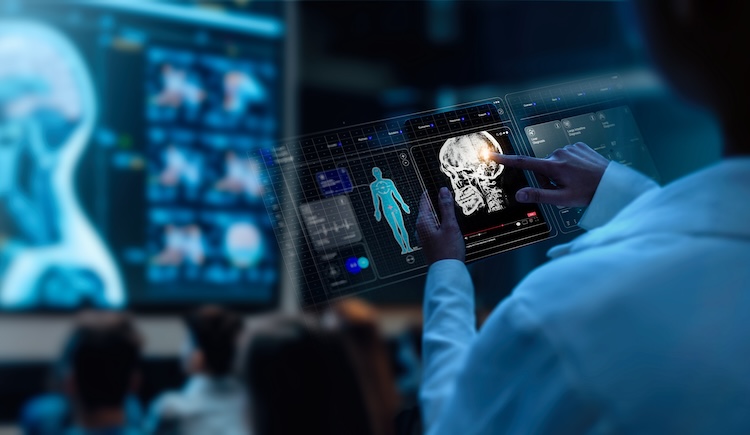
Today, artificial intelligence (AI) is changing the trajectory of health care—from automating routine tasks and increasing efficiency to improving diagnoses, accelerating the discovery of more effective treatments, and so much more.
“When we talk about the application of AI, we can think of applying it across the entire spectrum of health care specialties, from the administrative side through to clinical care,” explains Samir Kendale, MD, FASA, medical director of Anaesthesia Informatics at Beth Israel Lahey Health, assistant professor of Anaesthesia at Harvard Medical School, and course director of the Harvard Medical School Continuing Education course, AI in Clinical Medicine.
The Need for Clinicians to Get Up to Speed on AI
Despite the potential AI brings, Kendale points out that many health care providers are not yet familiar with this technology. “AI wasn’t introduced in medical school until recently,” he says. This means that generations of doctors have not been trained on how AI works or how to use it. But, with changing times comes the need for clinicians to fill in their skill gaps in this area.
“It’s prime time for clinicians to learn how to incorporate AI into their jobs,” agrees Maha Farhat, MD, MSc, associate physician of Pulmonary and Critical Care at Massachusetts General Hospital, and Gil Omenn, Associate Professor of Biomedical Informatics at Harvard Medical School. Farhat also joins Kendale and Isaac Kohane, MD, PhD, as a course director of AI in Clinical Medicine.
When clinicians get up to speed on AI, Farhat says that they will be able to use the latest tools strategically to benefit their practices, their health systems, and the patients they serve. “AI can help us learn new approaches to treatment and diagnostic testing for some cases that can reduce uncertainty in medicine,” she says.
Exploring AI Use Cases
Here are several examples Kendale and Farhat share that illustrate the benefits AI can bring:
- AI can automate tasks to free up a clinician’s time to focus more on their patients, “humanizing” care in new ways. With many health care providers feeling overworked today, tools like medical scribe technology can automatically capture visit notes and store them in a patient’s medical record, even flagging key details and insights. This can increase efficiency and free up clinicians to focus more on face-to-face time with their patients. “Doctors can also use AI algorithms to write letters to patients, to collect past history and summarize it to support medical decision making, and to select the best medicine for each patient’s specific case,” Kendale says. All of this can reduce the manual and cognitive burden that many clinicians are feeling. Ultimately, this can help prevent clinician burnout while improving the patient experience.
- AI can help clinicians better interpret imaging results. For instance, in gastroenterology, AI can improve the process of getting colonoscopy results, using image recognition to detect and identify polyps on the imaging files. AI can also be used to interpret EKG and CAT scan results and to identify irregularities. While this doesn’t replace the need for specialists in pathology, histology, or radiology, Kendale points out that it can help these experts put their time to better use. Additionally, AI can clear those imaging tests with normal results and flag those that need to be reviewed more closely by the experts, helping them focus their time in the very best way. AI can also help clinicians hone in on the top four or five possible diagnoses to consider. This means that patients can get their results sooner, and clinicians can spend more time focused on patient care.
- AI can help health care organizations improve quality and safety. One example is using AI software to review a large amount of data quickly and easily to identify people at high risk of developing sepsis. This can enable a health system to respond proactively to try to prevent this problem, such as moving a high-risk patient to a unit with higher acuity staffing. AI can also identify people who have a higher likelihood of developing opioid dependency after surgery to monitor them closely and wean them off the drugs as soon as possible. In addition, it can be used to identify areas where drug errors are most likely to occur in a health system so the staff can implement stronger safety protocols. These are just a few of the many ways that AI can be used to help achieve value-based care.
- AI can be an important source of data and expertise for clinicians. In the past, clinicians had to do extensive research to help zero in on a case that was difficult to diagnose or treat. Today, clinicians can ask AI chatbots diagnostic questions and gain immediate access to a wealth of information and advice, saving hours or even days of searching for similar cases. AI can also support clinical decision-making. When clinicians are looking at similar cases to predict who will best respond to certain treatment options, AI can help them better personalize their treatment regimens.
- AI can aid in the diagnosis and treatment of rare diseases. One of the challenges of diagnosing and treating someone with a rare disease has traditionally been that clinicians may not recognize the signs of a condition they have not personally encountered. Finding other cases of rare diseases online can also be challenging. By scanning large data sets to find similar cases, AI can help clinicians not only get to a diagnosis more quickly but also find examples of treatments that have been effective in people with this condition.
How to Leverage AI
For clinicians looking to boost their AI IQ within their own organizations, Kendale stresses the need to look for the person or team in the health system who oversees informatics. They will be well positioned to explain the options that exist and share the process to integrate these tools into existing workflows or use them to improve processes.
Clinicians can also connect with local, state, and national professional organizations to learn more about using AI and explore the wealth of ways it can benefit their practices and their patients.
Expand your knowledge on AI today
Over the last two decades, the digitization of medical records created opportunities for automation and data-driven clinical support for a range of routine clinical applications. Today, artificial intelligence (AI) is accelerating innovation in clinical medicine. We are on the cusp of revolutionizing how we care for patients in profound ways.


